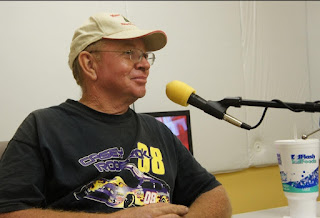Proud Daddy
In several conversations with Sonny Pollard since he and his family repurchased Senoia Raceway and began transforming it into one of dirt racing’s better facilities, he’s asked me: “Do you think my daddy would be proud?”
And my answer is always: “Yes.”
Hence
Pollard died young and has been gone for years, but his influence on Georgia
auto racing remains strong, and that’s a big reason he was recently elected as
a member of the Class of 2023 of the Georgia Racing Hall of Fame. He joins
long-time Atlanta Motor Speedway president Ed Clark, Hall of Fame founder
Gordon Pirkle and short-track asphalt racers Bob Leach and Sandy Goss.
On
a personal note, it was Hence who helped start my career as a motorsports
journalist by giving me a season pass when I was just a teenager. I tried to repay him by sending in
results from the track to the old Atlanta radio stations WBIE and WPLO and to
the Atlanta newspapers, and that eventually led to a career as a full-time writer.
I
still have the same desire to support his race track and the local dirt racing
Hence Pollard loved, which is why I write this blog.
But
Hence’s real legacy is what his kids and grandkids have done in the sport.
That’s described in his bio on the Hall of Fame ballot.
Here’s
the bio:
Sonny
Pollard, the current owner and promoter at Senoia, vividly recalls a time when
he wasn’t yet 10 years old, riding home with his father Hence Pollard and a
family friend from the races at Coweta Raceway.
“We
were coming home that night and my daddy said he was going to build a race
track,” Pollard said. “I didn’t know what to think.”
But
Hence Pollard, who made his living sawing timber and farming and was a
successful drag racer at the old drag strip near Fairburn, pursued his
stock-car dream. He and a local grading contractor, David Bishop, went to work
and built a 3/8-mile dirt oval on the Pollard farm.
They
opened the track in 1969, and the Pollard family ran the track until Hence
Pollard’s death in 1981 at the age of 53.
Did
Hence Pollard, a successful businessman, build Senoia Raceway to make money?”
Sonny
Pollard can answer that: “No, no, no, no,” he said. “Racing was his passion.”
Unlike
many promoters, Pollard left the business of running the pits to the people he
hired. He watched the races from a fan’s perspective – from a picnic table
overlooking the track.
Pollard
did step in when needed to keep his racers happy. Once, a driver down on his
luck told Pollard after yet another crash that he wouldn’t be able to make the
next Saturday night’s show. “How much will it cost to fix your car?” Pollard
asked. The driver responded that $75 would cover it. Pollard pulled $80 from
his wallet, handed it to the driver and told him he’d see him the next week.
And
he did.
Once
Georgia Racing Hall of Fame driver Mike Head missed a race because he couldn’t
afford the repair bill on his engine. Pollard found out, summoned Head to his
home and gave Head the money he needed to get his engine back.
Head
was loyal to Senoia Raceway for as long as the Pollards owned it.
In
recent years, Hence Pollard’s family has repurchased Senoia Raceway, sold after
his death, and turned it into a dirt-track showplace. Sonny Pollard said the
work he and his family have done to the facility is a way to honor his father’s
memory and be able to share the family patriarch’s passion for racing with a
new generation of fans.
Hence
Pollard’s legacy also includes the accomplishments of his grandchildren. Bubba
Pollard is among the nation’s most successful – and most popular asphalt short
track drivers. His sister Andrea is known for her skills as a tire specialist
and spotter. And another grandson, Phillip Bell is an engineer with Legacy
Motor Club and the No. 42 Chevrolet driven by Noah Gragson on on NASCAR’s Cup
Series.
And then
there’s the race track, which the Pollards operate along with several
successful businesses.
“There’s
not a lot of money to be made running a race track,” Sonny Pollard said. “It’s
something we love to do, just like my daddy did.”




Comments
Post a Comment